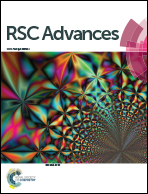Amidoxime-functionalized bead cellulose for the decomposition of highly toxic organophosphates†
Abstract
Regenerated bead cellulose is a promising material with excellent mechanical and rheological properties, ideally suited for advanced environmental applications. By introducing the amidoxime functional group into the glucose unit at the C-6 position, highly effective reactive sorbent was prepared and used to destroy priority hazardous substances such as organophosphate pesticides or nerve-paralytic chemical warfare agents (CWAs). Quantum mechanical (QM) calculations were performed to study the interactions of organophosphates with amidoxime functional groups at the molecular level. It was found that the energetic reaction barrier of the rate-limiting step is markedly reduced (from 31.40 to 11.37 kcal mol−1) in the case of the amidoxime-catalysed degradation of parathion methyl, which resulted in a dramatic increase in the degradation rate; this was fully confirmed by experiments, in which the pesticide degradation proceeded at the time scale of several hours (t1/2 = 20–30 hours at pH 7.22).



 Please wait while we load your content...
Please wait while we load your content...